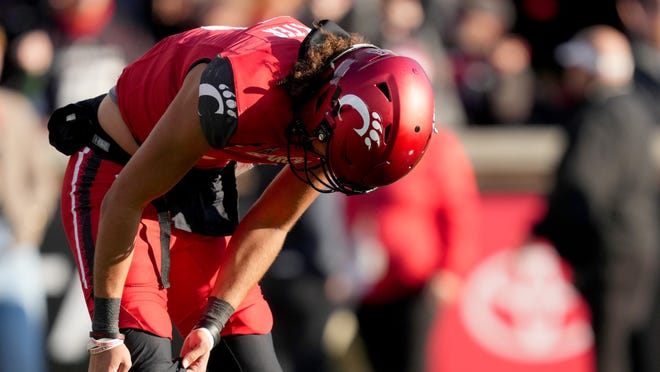This year in Hamilton County, 15 juveniles have been charged with murder, more than were charged in the last four years combined. Why the increase? 'Kids Who Kill,' The Enquirer's series on juvenile violence, continues with this conversation.

Police Detective Takia Smith works in the violent crimes unit and investigates homicides. A Cincinnati native who grew up in English Woods and West Price Hill, she’s familiar with the neighborhoods where the violence she investigates occurs. She’s the mother of a 14-year-old girl.
Enquirer reporter Dan Horn: I know what the numbers say, but what are you seeing out there?
Det. Smith: Last year, we saw young people, but not teenagers. This year, it’s the teenagers.
They don’t know how to rationalize. They don’t know how to communicate. They are driven by their anger. It’s like a toddler. If an adult slaps a 2-year-old on the hand and tells them ‘no,’ the 2-year-old will hit you right back. Because that’s what they’re reacting to. They don’t think. They don’t rationalize.
Whereas an adult, they have a lot to think about. They rationalize: I have a girlfriend or a wife. I might have kids. I’ve been in jail before. I don’t want to go to jail again.
Teenagers don’t do that?
They’re willing to throw it away because they want to be accepted somewhere. A lot of times it’s clout. This is what I did. Now they’re accepted somewhere. Now somebody is hyping them up. It’s just scary. Even young rappers, what they’re rapping about, they’re really doing it. Every year, they’re really dying, really going to jail. They’re not just telling stories anymore. They’re doing it. These young people, they’re impressionable. They mirror what they see.
If you look at their Facebook, because we follow a lot of these on Facebook, the stuff they say on their Facebook is the stuff they say in rap lines. They’re doing it.
They talk about it on Facebook?
They openly talk about it. They just do it. It’s just ugly now. You see these kids, they’re just doing what they want to do. No consequences. No care.
What about their parents?
A lot of times they don’t have that parent at home that they can lean on. A lot of these parents, such as myself, they have these kids at a young age. So now we’re growing up with our kids. You got the one side that tries to raise them right and you got the other side that still wants to be young.
You can’t be your kid’s friend. You just can’t. They need guidance. They need discipline. And they don’t have that. There’s a lot of those kids that are missing that. And it’s scary. We lost way too many innocent bystanders because of kids. I always tell people: Our kids are the scariest criminals. They don’t care. They haven’t reached their full potential to care. That comes with age.
They don’t understand the consequences?
Nope. When I interviewed my first 14-year-old (homicide suspect), I’m thinking to myself, he don’t even understand what he did to his life. Consequences? What are consequences? They don’t know. They don’t understand.
That first time, tell me about it.
I talked to him, like, three and a half hours. Just sitting there. To me, in my head, I’m thinking this 14-year-old is not going to mastermind me. I have a 14-year-old daughter and I’m going to talk to him like I will talk to my child if I’m trying to get the truth out of her. You can’t be jaded and talk to them bad. This is a kid.
What did you say to him?
We had to ask him about the players in this homicide. It was more than just him. With a kid, they’re thinking that I’m snitching. So you can’t really come at a kid like that. All he’s thinking about is the street code.
Did he say what he did?
He told everything. We had a long conversation.
What motivated him? Was it anger? Was it drugs?
No. He just wanted to be a part. He was being manipulated by the older people. And the money.
And that made him feel like he was part of something?
He’s easily manipulated. He’s only 14. It’s just sad. I’m looking in the house (after arresting him). My first instinct is, he has nothing to live for. When I’d seen his living conditions, I’m like, what did we expect? Even though I hated what he did and the crimes that he did, talking to him gave me a different view. This is a kid. I’d seen the little boy inside him. You can just see it. When he said yes ma’am, and when I’m telling him you need to look me in the eyes, and you need to talk to me.
It’s just sad. Was his father in the house? No. His mother was barely in the house. His mother was running around being like him.
He wants somebody to tell him what he needs to do. He wants direction. He wants guidance. He just was getting it from the wrong place.
That was your first case involving a young kid?
Yeah. I don’t like what he did. But at the end of the day, I didn’t write his story. We oftentimes forget that. If you was put in that same situation, you don’t know. I grew up in English Woods. And then I grew up in Price Hill when it was rough. I always ask myself, how did I escape that?
How did you?
My parents just did the best they can and said, ‘Hey, look, you’re not going here. You’re not going there.’ Even though we lived in poverty, I didn’t have to be a part. I stayed out of the mix of that. That was the difference.
I have a 14-year-old daughter. I still check my child’s room. I check her phone. Even though she’s not a problem child, teenagers are teenagers. I had my daughter at 20. I was young. If I didn’t have my mom, my dad and great people around me to show me what it’s like, who knows where I would’ve been? I knew I wanted to give my daughter a better life.
Everyone doesn’t respond that way.
No. I’d seen what happened in those neighborhoods. I didn’t want my child to become a product of that.
What’s it like doing this job while raising a daughter?
It’s just scary. Just imagine my job and what I see. (She mentions the two fatal shootings at Smale Park in July, where hundreds of young people had gathered.) My daughter, she can never go down there. She’s got friends who hang down there. She hated me for a whole summer because she was never allowed down there, because I just know these young boys. They want to be down there. They think it’s cool to fire a gun.
I don’t want to be nowhere teenagers are at. I just don’t. When I see teenagers, I don’t want to be there.
Do you talk to your daughter about your work?
I try to separate work from home when it comes to my daughter. The hardest thing for me is when a young person dies and my child asks, did I know this person? I don’t talk to her about this stuff, but she came to me (recently) and said, ‘Mom, did you hear about this guy?’ It was on some social media site. I think it was Snapchat. They were just passing his picture around.
What happened was, they (shared a photo of) his body lying in the street. It was viral. This was a 16-year-old that they snapped a picture of. I was so mad. I couldn’t control it. Before I walk in my house, I leave (my job) at the door. When I opened the door and walked in, it was in my house.
And my daughter was asking me about it. And she’s like, ‘Is that your case?’ Because she’s always intrigued. She sees me leaving in the middle of the night. When she sees me leaving, she knows somebody died.
What do you tell her?
I say these teenagers are out here shooting and killing each other. I don’t want to scare her. I just try to talk to her the best way I can without freaking her out or putting too much on her.
Does it affect her?
We were talking about dating. We always joke. I said, ‘You have to be 31 and out of college.’ She said, ‘All the boys, they’re all going to be dead anyway.’ That’s what she said to me. They’re all dying anyway.
She’s a real jokester, but I’m thinking to myself, that is sad. That joke stemmed from something. You just don’t joke like that.
Do you see a way out of this?
I wish I did. I wish I could just scream and tell everybody to stop.
The following conversation has been edited for clarity. Enquirer reporter Dan Horn recorded and transcribed the interview before editing. In some cases, questions and answers have been shortened and moved to make the conversations easier to follow and to remove unnecessary asides and repetitions.
Source link









